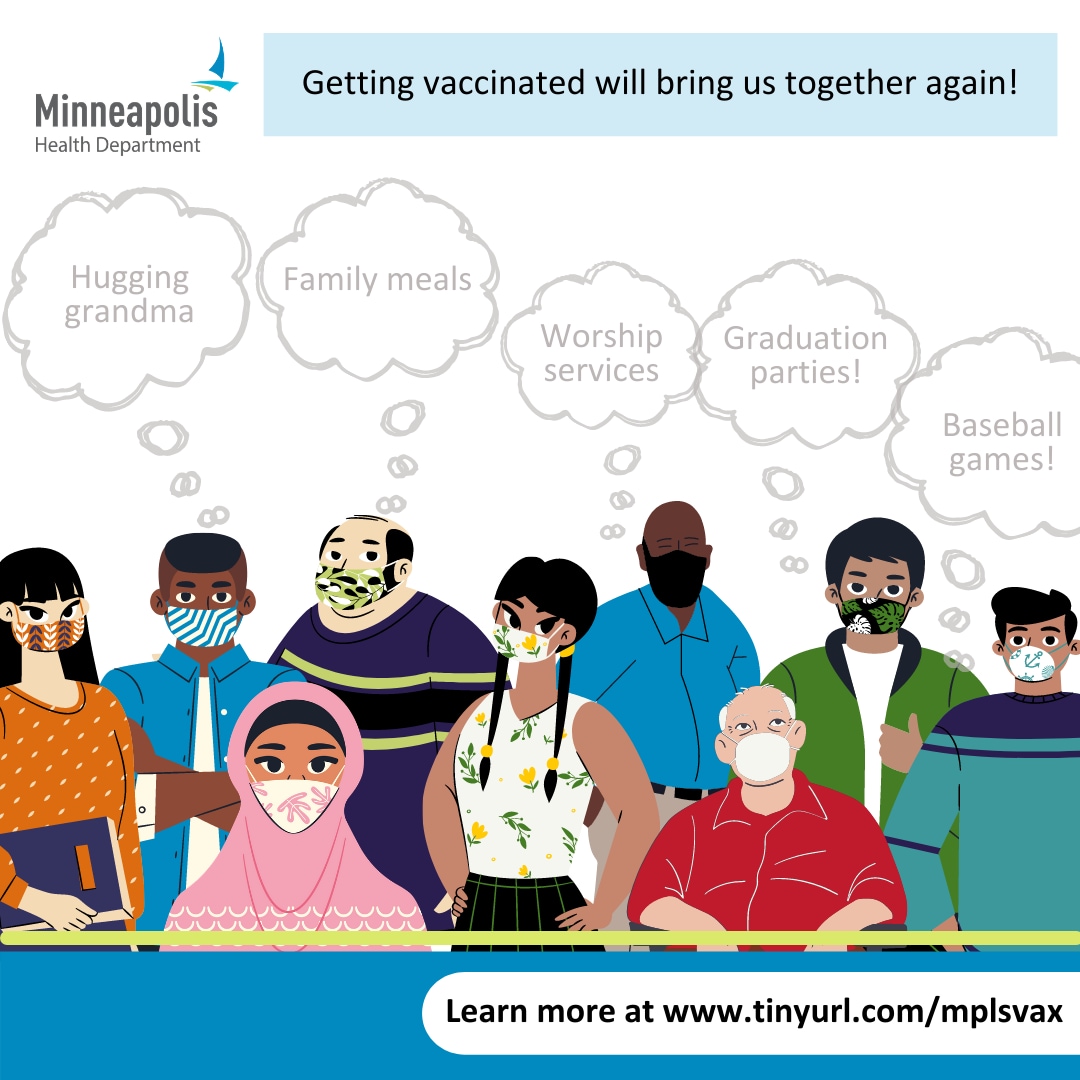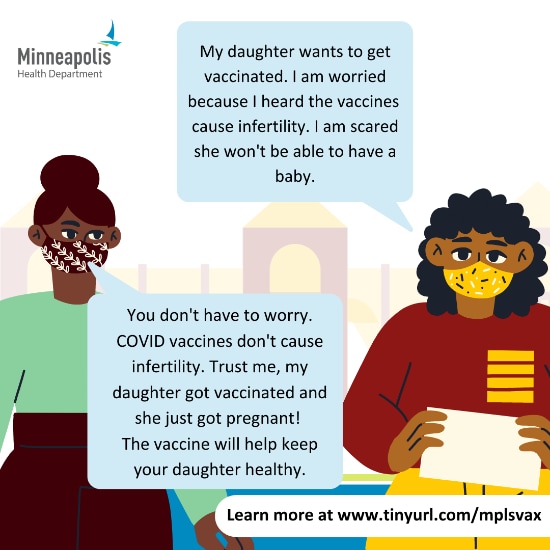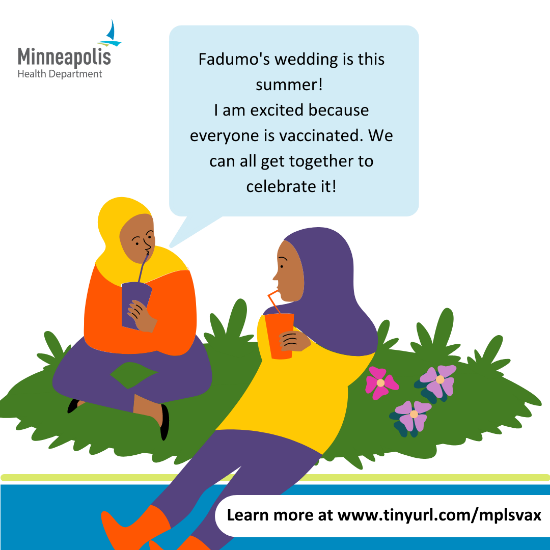Trusted Partners Help Minneapolis Somali Community Get Vaccinated

Minneapolis is home to the largest population of Somalis in North America. When COVID-19 vaccines gradually became available to the general U.S. population in early 2021, vaccine demand among the roughly 52,000 people in the Minneapolis Somali community was low, and vaccine hesitancy was a major challenge. During that time, many Somali residents were confined at home and did not understand English.
Their lack of access to vaccine facts and resources allowed misinformation and disinformation to spread quickly. Among this population, COVID-19 vaccine hesitancy largely stemmed from a history of past traumatic experiences combined with unfounded fears that autism is linked to the measles, mumps, and rubella vaccine.
For many Minneapolis Somalis, life centers on the Muslim faith, family, and community. To increase COVID-19 vaccinations in this population, the Minneapolis Health Department (MHD) partnered with Somali faith-based, medical, and community organizations whose trusted leaders encouraged their members to get vaccinated.
“A faith-based approach resonates with us,” says Ms. Sumaya Noor, a public health specialist at MHD and a Somali community member. “I would encourage other health departments that work with Somali and other Muslim communities to consider this strategy.”
Teamwork and close collaboration with experts at the Minnesota Department of Health enabled MHD to implement several strategies that increased COVID-19 vaccinations among the Somalis they serve. These strategies included partnering with imams (Muslim leaders) and Somali doctors to educate people online and in person, and partnering with health groups to vaccinate people in their homes.
Trusted Imams Lead the Community by Example, and with Facts and Encouragement
The Islamic Association of North America and trusted local faith leaders collaborated with MHD to develop strategies to encourage more Somalis to get vaccinated. They knew that Minneapolis Somalis relied on the internet for information and engagement with their family, friends, neighbors, and mosque during the pandemic. In addition, many of them did not understand English.
To reach their congregations in this new environment, imams communicated in Somali and English through social media, e-newsletters, their mosque websites, and Somali TV Minnesota, to encourage Muslims to get vaccinated. They documented and shared their vaccination experiences through photos on their mosque websites and on YouTube, Facebook, and WhatsApp.
During virtual live question-and-answer sessions on YouTube Live, Dr. Mohammed Faluk with the Somali Medical Association of America addressed callers’ questions and concerns about COVID-19 vaccines. Importantly, he reassured Muslims that getting a COVID-19 vaccine does not break the Ramadan fast, and that, contrary to rumor, COVID-19 vaccines do not contain pork.
The doctor, who is a member of the Somali community, also used a virtual live call-in session about COVID-19 vaccines to share scientific information, answer callers’ questions, and dispel misinformation and disinformation.
When in-person Friday ceremonies resumed at the mosques, imams encouraged their congregations to get vaccinated. To increase convenience and trust, they invited the Minnesota Department of Health to hold its vaccine clinics at the mosques.
MHD Partnered with Trusted Organizations to Encourage Vaccination
At People’s Homes
Not everyone, especially older adults, had access to a computer and the internet or the ability to use them to take part in virtual sessions, and some people were unable to travel to vaccination sites.
To serve these vulnerable community members, MHD collaborated with the Minneapolis Public Housing Authority to identify 39 public housing high-rises and three other low-income housing properties whose residents could benefit from at-home COVID-19 vaccinations. MHD partnered with nurses from local healthcare provider Hennepin Healthcare to visit identified public housing residents—including many Somalis—in their homes. MHD staff answered the residents’ questions and concerns, and the nurses vaccinated those who were willing.
Online
MHD’s culturally relevant online educational messages—with animations, dialogues, and facts that negate false claims—include a social media toolkit with more than 50 messages and graphics designed to reach Somalis and other communities in various scenarios.
During the spring-through-summer 2021 Somali wedding season, the message is to get vaccinated before you gather.
MHD partnered with Somali Community Resettlement Services in Minneapolis and organizations that represent other minority communities to create and share culturally appropriate messages in multiple languages. Partnerships included:
- Native Americans’ MIGIZI
- Latinx-led Unidos MN
- Southeast Asian Diaspora Project
- African American digital newspaper Insight News
MHD is also sharing a collection of 30-second video clips in five languages of trusted messengers from various Minneapolis communities telling viewers why they got their vaccinations.
Collaborations Facilitate Success


Ms. Noor attributes MHD’s success in increasing COVID-19 vaccinations among Minneapolis Somalis to the hard work of a large collaborative team. “Adaptability is important,” she notes. “As things change, our strategies adapt, and we find different ways to engage the community.”
MHD works closely with and receives information and guidance from the Minnesota Department of Health and CDC.
A grant from the National Association of County and City Health Officials helped MHD increase uptake of COVID-19 and other vaccines by enabling the agency to provide its partners with strategies and tips for effectively working with Somali residents. The grant also funded MHD’s contract with the non-profit Kulan Center to survey 50 Somali families about their barriers to and facilitators for getting a COVID-19 vaccination.
Key Takeaway
“Approach the community with empathy and understanding, and acknowledge the historical trauma. Share the facts but leave it up to them whether or not to vaccinate,” Ms. Noor advises. “Establishing trust is the key.”
What are you, your health department, or your organization doing to support COVID-19 vaccination in your community? Share your story with communityfeatures@cdc.gov and you could see it on our COVID-19 Vaccine Community Features page.